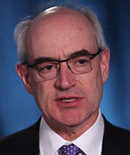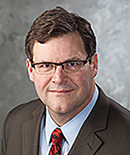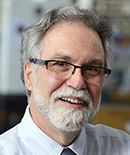The final two days of the ATS Keynote Series will feature presentations on managing tuberculosis, how precision medicine affects lung cancer trials, a geological perspective on climate change, and the effects of low oxygen levels on several illnesses.
Two addresses will be presented from 8:15 to 9 a.m. on both Tuesday and Wednesday. The Keynote Series highlights state-of-the-art lectures on a variety of topics to showcase major discoveries in pulmonary, critical care, and sleep medicine.
Tuesday

Keertan U. Dheda, MD, PhD
Changing Face of an Old Enemy: New Insights Into the Pathogenesis and Management of Drug-Resistant TB (K5)
East Salon A-C (South Building, Street Level)
Walter E. Washington Convention Center
A leading researcher of infections and immunity of the lung, Keertan U. Dheda, MD, PhD, will discuss the latest studies of drug-resistant tuberculosis during his address.
Dr. Dheda is a professor of respiratory medicine at the University of Cape Town, South Africa. He also is the director of the university’s lung infection and immunity unit and head of its Division of Pulmonology in the Department of Medicine.

Everett E. Vokes, MD
Lung Cancer Trials in the Age of Precision Medicine (K6)
Salon G-I (South Building, Street Level)
Walter E. Washington Convention Center
A renowned expert in the study of head and neck and lung cancer, Everett E. Vokes, MD, will use his presentation to examine the use of clinical studies to develop targeted therapies for cancer treatments.
Dr. Vokes is the John E. Ultmann Professor of Medicine and Radiation Oncology at the University of Chicago. He also is the physician-in-chief and chair of the Department of Medicine at the University of Chicago Medical Center.
Wednesday

Kirk Johnson, PhD
Climate Change and Global Warming: A Geological Perspective (K7)
Salon A-C (South Building, Street Level)
Walter E. Washington Convention Center
During his keynote address, Kirk Johnson, PhD, the Sant Director of the Smithsonian National Museum of Natural History, will examine the effects of climate change from the perspective of its effect on Earth’s structure.
A paleontologist by training, Dr. Johnson has led the National Museum since 2012. In 2010, he led the Snowmastodon Project, a nine-month excavation of Ice Age animal bones, including mammoths and mastodons, in Colorado. He also has led expeditions in 11 countries and 19 states that resulted in the discovery of more than 1,400 fossil sites.

Gregg L. Semenza, MD, PhD
Hypoxia-Inducible Factors in Physiology and Medicine (K8)
West Salon G-I (South Building, Street Level)
Walter E. Washington Convention Center
Gregg L. Semenza, MD, PhD, will examine the effects of low oxygen levels on cells involved in a variety of illnesses during his address. Dr. Semenza’s laboratory discovered hypoxia-inducible factor 1, or HIF-1, a protein that switches genes on and off in cells in response to low oxygen levels.
Dr. Semenza is the C. Michael Armstrong Professor of Medicine at the Johns Hopkins University School of Medicine and director of the vascular program at the Johns Hopkins Institute for Cell Engineering.
